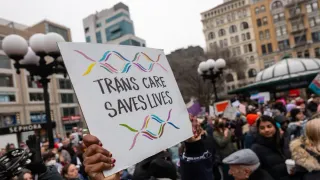May 26, 2015
Positive Women's Network Releases New Model for Trauma Awareness
EDGE READ TIME: 3 MIN.
Positive Women's Network - USA, a national membership body of women with HIV, is proud to announce the release of a new model for bringing trauma awareness and healing into primary healthcare settings.
The conceptual framework, developed in partnership with University of California - San Francisco (UCSF) clinician-researchers, provides a practical guide to help providers incorporate trauma-informed care into clinical practice.
"Trauma-informed care is the missing ingredient to engage women with HIV in care successfully and to ensure good health outcomes," said Naina Khanna, Executive Director of PWN-USA, who co-authored the paper presenting the new model.
Rates of intimate partner violence and post-traumatic stress disorder are estimated to be 55 and 30 percent, respectively -- much higher than national rates -- among women with HIV.
"HIV care and treatment cannot work if women can't get to the healthcare provider in the first place, because they have trauma-adaptive coping mechanisms getting in the way of showing up," said Khanna, "or because unaddressed trauma and a healthcare environment that ignores trauma are making it difficult for a woman to communicate with her provider about what her real healthcare needs are."
The model was published in Women's Health Issues, and calls trauma-informed primary care "a practical and ethical imperative for women's health and well being."
"Addressing trauma is our opportunity to move beyond treatment to actual healing for women with HIV," Khanna explained.
Advocates believe that failure to heal from the effects of current and past trauma explains the crater in the HIV care continuum for women: Only 70 percent of women with HIV link to care, and fewer than half remain connected to care.
The paper's lead author, Edward L. Machtinger, MD, director of the Women's HIV Program at UCSF, called understanding the link between trauma and overall health "an epiphany for clinicians."
"Many of us have spent years struggling to help our patients be genuinely healthy and strong, but did not realize that there was a missing ingredient in our care model," said Machtinger, a pioneer in trauma-informed care research and practice.
"Because trauma is so common, we need to critically examine how the healthcare environment affects not only patients, but also providers and staff," added Leigh Kimberg, MD, UCSF Professor of Medicine at San Francisco Hospital and Trauma Center and the paper's senior author, in a recent statement. "By adopting foundational trauma-informed practices and policies, healthcare providers and staff promote increased safety, reliability, trust, and empathy to create a more healing environment for everyone."
The changing landscape of healthcare delivery, and of the HIV care system, finds the US at a critical moment of opportunity to transform these systems. While the first National HIV/AIDS Strategy failed to address the parallel epidemic of violence and trauma among women, President Obama's creation of an Interagency Federal Working Group on the Intersection of HIV/AIDS, Violence Against Women and Girls, and Gender-Related Health Disparities was an attempt to correct this oversight.
The next National HIV/AIDS Strategy will soon be released, and must fully integrate the Federal Interagency Workgroup's call for trauma-informed approaches to be implemented in all settings where women with HIV receive care and services. The recently published care model provides a blueprint for providers to begin to make this vital commitment to their clients.
Read the full text of the paper, "From Treatment to Healing: The Promise of Trauma-Informed Primary Care," here






